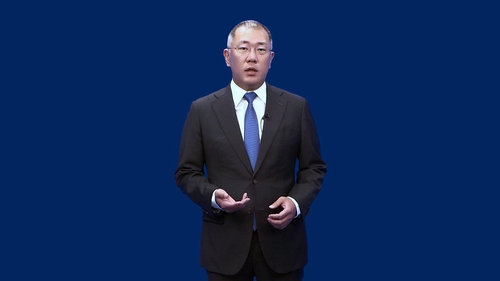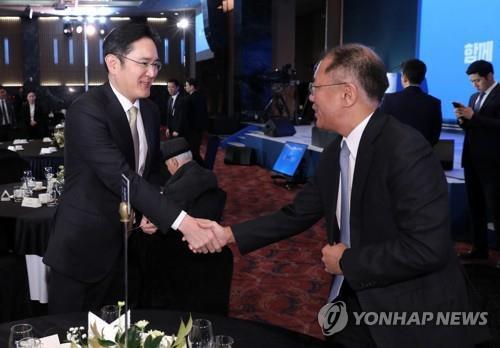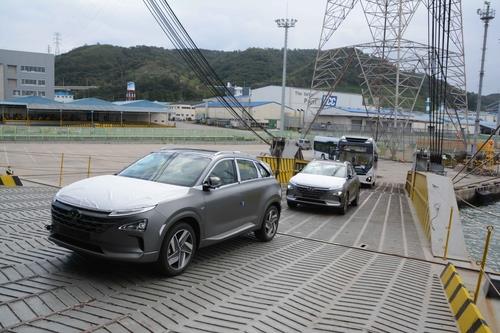- California Assembly OKs highest minimum wage in nation
- S. Korea unveils first graphic cigarette warnings
- US joins with South Korea, Japan in bid to deter North Korea
- LPGA golfer Chun In-gee finally back in action
- S. Korea won’t be top seed in final World Cup qualification round
- US men’s soccer misses 2nd straight Olympics
- US back on track in qualifying with 4-0 win over Guatemala
- High-intensity workout injuries spawn cottage industry
- CDC expands range of Zika mosquitoes into parts of Northeast
- Who knew? ‘The Walking Dead’ is helping families connect
Heir Chung Euisun officially takes helm at Hyundai Motor Group
Hyundai Motor Group’s longtime heir Chung Euisun on Wednesday officially took over the helm at the South Korean auto giant as it pushes to morph into a future mobility solutions provider.
The group’s three major affiliates — Hyundai Motor Co., Kia Motors Corp. and Hyundai Mobis Co. — held separate board meetings to name the only son of octogenarian Chung Mong-koo, who had led the Korean automotive group since 2000, as new group chairman.
The 49-year-old has been promoted to the top position of the world’s fifth-biggest carmaker as he unveiled a future mobility vision and preemptively invested in overseas companies with advanced technologies in autonomous and other next-generation vehicles, the company said in a statement.
“We are committed to providing mobility solutions optimized for customers’ lives and are targeting to strengthen our presence in autonomous driving, electrification, hydrogen fuel cell and robotics and urban air mobility (UAM),” the new chairman said.
UAM is a key future innovation business that can help overcome urban challenges like traffic congestion by connecting the sky and the ground.



This photo taken on Oct. 14, 2020, shows Hyundai Motor Group Chairman Chung Euisun delivering an online speech to employees after he was promoted to chairman of the group at its headquarters in Yangjae, southern Seoul. (Yonhap)
The management change at Hyundai Motor Group came as the carmaker struggles with weak sales amid a prolonged COVID-19 pandemic and tougher competition with rivals.
From January to June, Hyundai Motor’s net profit plunged 52 percent on-year to 929.95 billion won, and Kia’s also plummeted 66 percent to 392.28 billion won.
The junior Chung has served as de facto leader of Hyundai Motor Group since he was named executive vice chairman in September 2018. He earned his MBA at the University of San Francisco and began his career at Hyundai in 1999.
The new chairman has been leading design innovation at Kia by hiring dozens of foreign talents since 2006, starting with former Audi designer Peter Schreyer, who adopted the signature “tiger-nose” grille.
In 2015, he led the launch of the independent Genesis brand separately from the Hyundai brand and announced the plan to develop the high-performance N brand cars, such as the i30N and the i30 fastback.
In March, the group set up a 50:50 joint company Motional in Boston with Ireland-based autonomous vehicle startup Aptiv to develop a self-driving platform with Level 4 to 5 autonomous technology by 2022 and supply it to global carmakers.
Hyundai Mobis has been conducting a motorway test of Level 3 technology in its M.BILLY autonomous car since 2018 in South Korea, the United States and Europe. Since Level 3 cars are only good for limited self-driving, the driver must be available to take control of the car if the need arises.
A Level 3 car, if fully developed, will allow lane changes and other autonomous driving functions to work without intervention by the driver.
There are five levels of driving automation defined by the Society of Automotive Engineers International.
The company introduced a Level 4 self-driving automation technology in its concept M.VISION at the Consumer Electronics Show in Las Vegas in January last year.
At Level 4, a vehicle can drive itself under limited conditions and will not operate if all required conditions are not satisfied. At Level 5, a vehicle’s automated driving features can drive under any conditions.
In January, Hyundai Motor announced it will invest more than 100 trillion won (US$87 billion) in future mobility for the next five years.
The group aims to sell 1 million electric vehicles in 2025 as it strives to gain a share in the global EV realm.
Hyundai Motor and Kia Motors have sold a combined 270,000 electric vehicles in South Korea and overseas markets since 2011.
The two carmakers plan to unveil 44 eco-friendly vehicles, including 23 all-electric ones under the three separate brands of Hyundai, Hyundai’s independent brand Genesis and Kia, by 2025.
Currently, the group’s pure electric models are Hyundai’s Kona EV and Ioniq Electric and Kia’s Soul EV and Niro EV. An all-electric model under the Genesis brand is not available for now.
In recent years, global carmakers have stepped up efforts to go electric amid tightened regulations on emissions of greenhouse gases, which scientists say are to blame for global warming.
To compete with global EV leaders, such as Audi and Mercedes-Benz, Hyundai has been looking for ways to strengthen or form business ties with local conglomerates Samsung Group, LG Group and SK Group in EVs and joint investments in overseas startups with future mobility technologies.
Moreover, Hyundai aims to establish a production facility capable of rolling out 50,000 hydrogen-powered vehicles a year by 2030. It also targets selling 200,000 hydrogen fuel cell systems a year in global markets by the same year.
In 2020, Hyundai is targeting selling 10,100 Nexo hydrogen passenger cars, mainly to public organizations and companies, more than doubling from the 4,194 units it sold last year.
Hyundai sold 10,698 Nexos — 8,908 units domestically and 1,790 overseas — in global markets from 2018 through August this year.
Hyundai has recently begun to export hydrogen commercial trucks and buses, paving the way for further exports of the eco-friendly vehicles.
In 2019, South Korea claimed a 52 percent share of the global hydrogen fuel cell electric market, followed by the United States with a share of 29 percent, Japan with 9.7 percent and Europe with 6.5 percent.
The chairman’s 82-year-old father will serve as honorary chairman of the country’s second-biggest conglomerate after Samsung Group in terms of assets.











